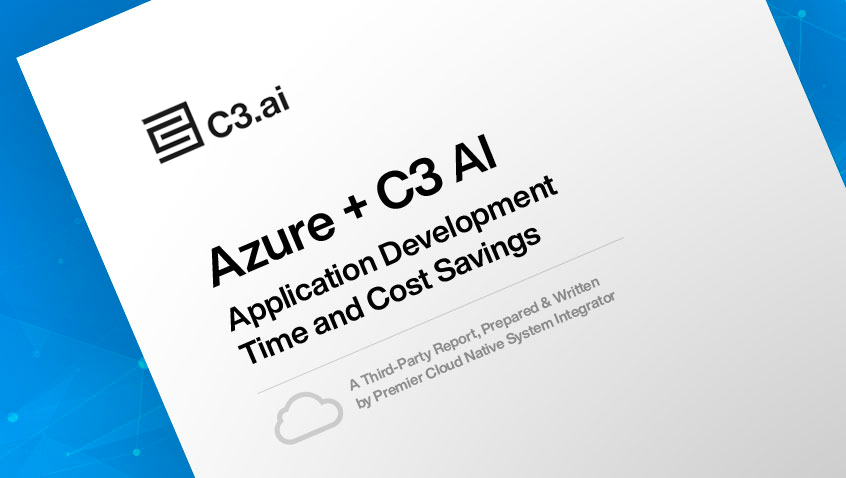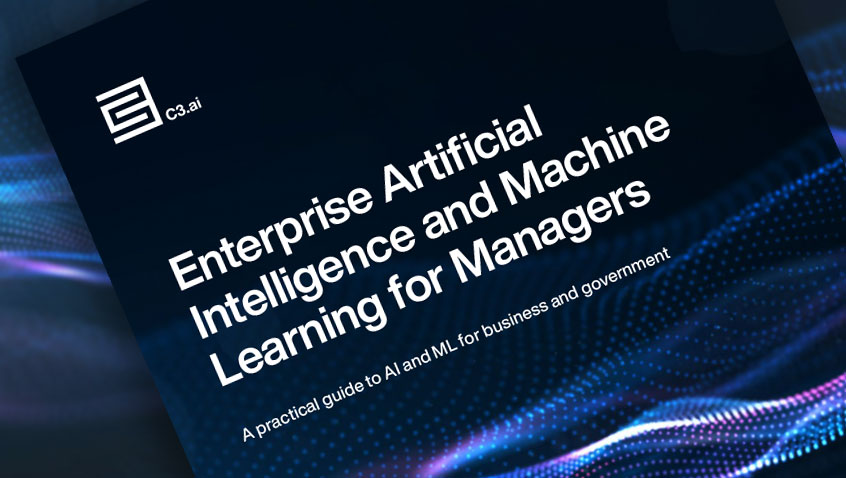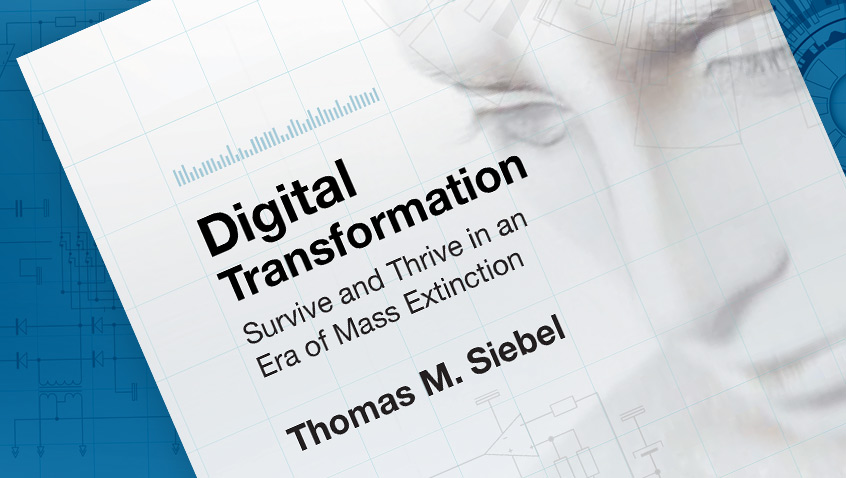- AI Software
- C3 AI Applications
- C3 AI Applications Overview
- C3 AI Anti-Money Laundering
- C3 AI Cash Management
- C3 AI CRM
- C3 AI Decision Advantage
- C3 AI Demand Forecasting
- C3 AI Energy Management
- C3 AI ESG
- C3 AI Intelligence Analysis
- C3 AI Inventory Optimization
- C3 AI Process Optimization
- C3 AI Production Schedule Optimization
- C3 AI Property Appraisal
- C3 AI Readiness
- C3 AI Reliability
- C3 AI Smart Lending
- C3 AI Sourcing Optimization
- C3 AI Supply Network Risk
- C3 AI Turnaround Optimization
- C3 AI Platform
- C3 Generative AI
- Get Started with a C3 AI Pilot
- Industries
- Customers
- Resources
- Generative AI
- Generative AI for Business
- C3 Generative AI: How Is It Unique?
- Reimagining the Enterprise with AI
- What To Consider When Using Generative AI
- Why Generative AI Is ‘Like the Internet Circa 1996’
- Can Generative AI’s Hallucination Problem be Overcome?
- Transforming Healthcare Operations with Generative AI
- Data Avalanche to Strategic Advantage: Generative AI in Supply Chains
- Supply Chains for a Dangerous World: ‘Flexible, Resilient, Powered by AI’
- LLMs Pose Major Security Risks, Serving As ‘Attack Vectors’
- C3 Generative AI: Getting the Most Out of Enterprise Data
- The Key to Generative AI Adoption: ‘Trusted, Reliable, Safe Answers’
- Generative AI in Healthcare: The Opportunity for Medical Device Manufacturers
- Generative AI in Healthcare: The End of Administrative Burdens for Workers
- Generative AI for the Department of Defense: The Power of Instant Insights
- What is Enterprise AI?
- Machine Learning
- Introduction
- What is Machine Learning?
- Tuning a Machine Learning Model
- Evaluating Model Performance
- Runtimes and Compute Requirements
- Selecting the Right AI/ML Problems
- Best Practices in Prototyping
- Best Practices in Ongoing Operations
- Building a Strong Team
- About the Author
- References
- Download eBook
- All Resources
- C3 AI Live
- Publications
- Customer Viewpoints
- Blog
- Glossary
- Developer Portal
- Generative AI
- News
- Company
- Contact Us
Glossary
- Artificial Intelligence
- AI in Finance
- Anomaly Detection
- Anti-Money Laundering
- Asset Performance Management
- Asset Reliability
- Digital Disruption
- Digital Transformation
- Digital Twin
- Elastic Cloud Computing
- Energy Management
- Enterprise AI
- Enterprise AI Platform
- Ethical AI
- Inventory Planning
- IoT Platform
- Know Your Customer (KYC)
- Machine Vision (Computer Vision)
- Model-Driven Architecture
- Multi-Cloud
- No Code
- Predictive Analytics
- Predictive Maintenance
- Stochastic Optimization
- Type System
- Data Unification & Management
- Machine Learning (A to L)
- Artificial General Intelligence
- Bias
- Canonical Schema
- Canonical Transform
- Classification
- Classifier
- Classifier Performance
- Clustering
- Coefficient of Discrimination, R-Squared (R2)
- Convolutional Neural Network (CNN)
- Correlation
- Data Cleansing
- Data Labels
- Data Lineage
- Deep Learning
- Dimensionality Reduction
- Explainable AI
- F1 Score
- False Positive Rate
- Feature Engineering
- Feedback Loop
- Field Validation
- Gaussian Mixture Model (GMM)
- Generalized Linear Models
- Gradient-Boosted Decision Trees (GBDT)
- Features
- Ground Truth
- Holdout Data
- Hyperparameters
- Information Leakage
- LIME: Local Interpretable Model-Agnostic Explanations
- Linear Regression
- Loss Function
- Low-Dimensional Representation
- Machine Learning (M to Z)
- Mean Absolute Error
- Mean Absolute Percent Error
- Machine Learning Pipeline
- Model Drift
- Model Prototyping
- Model Training
- Model Validation
- Normalization
- Overfitting
- Precision
- Problem Tractability
- Random Forest
- Recall
- Receiver Operating Characteristic (ROC) Curve
- Regression Performance
- Regularization
- Reinforcement Learning
- Reporting Bias
- Ridge Regression
- Root Mean Square Error (RMSE)
- Selection Bias
- Shapley Values
- Supervised Machine Learning
- Tree-Based Models
- Underfitting
- Unsupervised Machine Learning
- XGBoost
Artificial Intelligence
What is Coefficient of Discrimination, R-Squared (R2)?
The coefficient of discrimination, denoted R^2, is a commonly used performance metric for regression. It provides a measure of the proportion of the variance of a dependent variable that is explained by a regression model and defined by

Where y_i is a dependent variable, y ̂_i is the output of the regression model, both indexed by i, and ¯y is the mean of the dependent variable. R^2 is always less than or equal to 1; and the larger it is, the more of the variance of the dependent variable is explained by the regression model.
Why is the Coefficient of Discrimination, R-Squared (R2), Important?
The coefficient of discrimination is important because it is a commonly used and accepted performance metric for regression models.
How C3 AI Helps Organizations Use Coefficient of Discrimination, R-Squared (R2)
The coefficient of discrimination, or R^2, can readily be used readily as a performance metric by setting the scoring metric of a C3 MLPipe to MLRSquaredMetric.
Term
Digital Disruption
Definition
Digital disruption is the real or potential threat to a company’s viability posed by digitally enabled competitors. A classic example is (…)
What is a Digital Disruption?
Digital disruption is the real or potential threat to a company’s viability posed by digitally enabled competitors. A classic example is the disruption of the retail industry by digital competitors like Amazon, or the disruption of the personal transportation industry by companies such as Uber and Lyft. In each case, the disruptors employed digital technologies – including cloud computing, advanced data analytics, and artificial intelligence – to create new business models and capabilities to outcompete industry incumbents.
Digital competitors can be startups that are entirely new entrants into an industry or incumbents who adopt digital technology to innovate. Netflix, for example, started out with a rather traditional model enabling customers to receive movies as DVDs through the mail. The company eventually adopted new digital technology – streaming video – to change its business model, and deployed AI and advanced analytics to understand and predict customer
Why is Digital Disruption Important?
Digital disruption presents a potentially existential threat to many companies. In the retail sector, for example, numerous companies have declared bankruptcy or have gone out of business as a result of digital disruption. The taxi industry has been decimated in many areas around the world by the rise of companies like Uber and Lyft. In the financial services industry, hundreds of well-funded “fintech” startups are aiming to disrupt virtually every segment of the industry with digitally enabled offerings and business models.
Virtually Essentially every industry today is being challenged by digitally enabled competitors that seek to exploit vulnerabilities in traditional offerings and form new business models by harnessing digital technologies. Amazon founder and CEO Jeff Bezos famously said, speaking of traditional industry players, “your margin is my opportunity.” Digital capabilities such as AI can potentially enable a new breed of competitors to create offerings and business models with lower costs and better service than traditional competitors.
How C3 AI Helps Organizations Avoid Digital Disruption
To survive the threat of digital disruption, it is imperative for existing organizations to digitally transform. Industry incumbents have many advantages over potential digital disruptors, including massive amounts of current and historical operational data, large customer bases, extensive distribution networks, and valuable existing assets. C3 AI provides leading enterprise AI technology that enables large organizations to achieve step-function improvements across all their business processes by extracting new value from their existing data.
C3 AI provides the C3 AI® Platform , a complete, end-to-end platform for designing, developing, deploying, and operating enterprise AI applications at industrial scale., A portfolio of prebuilt, SaaS enterprise AI applications has been built on C3 AI Platform for a growing number of use cases such as predictive maintenance, inventory optimization, fraud detection, anti-money laundering, and more. Some of the world’s largest organizations – including Shell, the US Department of Defense, and Koch Industries – use C3 AI technology to drive digital transformation initiatives that significantly reduce costs, increase asset availability and reliability, improve human safety, and enhance customer satisfaction.



